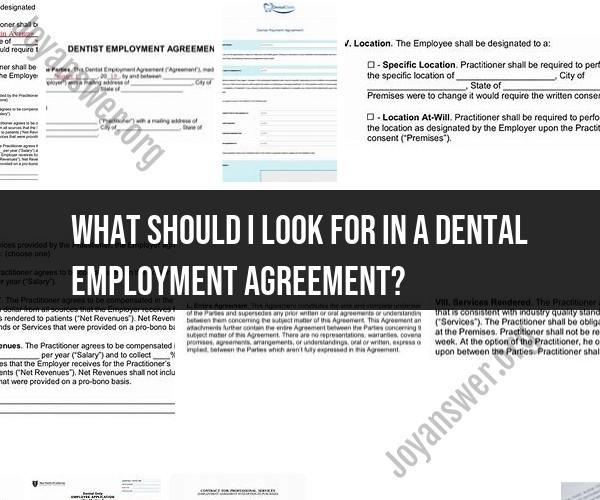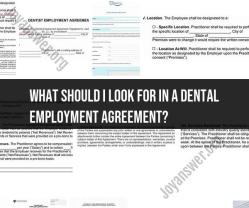What should I look for in a dental employment agreement?
A dental employment agreement is a crucial document that outlines the terms and conditions of your employment as a dentist or dental professional. It's important to carefully review and consider the following key elements when evaluating a dental employment agreement:
1. Position and Responsibilities:
- Clearly define your role and responsibilities as a dentist. Ensure that the agreement accurately reflects your job title, duties, and the scope of practice.
2. Compensation and Benefits:
- Review the compensation package, including your base salary, bonus structure (if applicable), and any other forms of compensation (e.g., profit-sharing, commission).
- Understand the benefits offered, such as health insurance, dental coverage, retirement plans, vacation days, sick leave, and continuing education allowances.
3. Term of Employment:
- Determine the duration of your employment contract, whether it's for a fixed term (e.g., one year) or indefinite. Understand the notice period required for termination by both parties.
4. Termination Provisions:
- Carefully read the termination clauses. Consider the circumstances under which either you or your employer can terminate the agreement, including termination with or without cause.
5. Non-Compete and Non-Solicitation Clauses:
- Be aware of any non-compete or non-solicitation clauses that restrict your ability to work in a certain geographic area or solicit patients after leaving the practice. Ensure that these restrictions are reasonable and not overly broad.
6. Confidentiality and Intellectual Property:
- Understand the confidentiality requirements, particularly regarding patient information and practice-related data.
- Clarify ownership of any intellectual property, such as patient records or treatment protocols, developed during your employment.
7. Compensation for Additional Services:
- If you are expected to perform additional services, such as on-call duties or emergency care, ensure that the compensation and reimbursement for these services are clearly outlined.
8. Malpractice Insurance:
- Confirm whether malpractice insurance is provided by the employer or if you are required to obtain your own coverage. Understand the limits and scope of the coverage.
9. Restrictive Covenants:
- Pay attention to any restrictive covenants that limit your professional activities after leaving the practice. Seek legal advice if you have concerns about their enforceability.
10. Continuing Education and Professional Development:- If the agreement includes provisions for continuing education and professional development, review the details, including the financial support provided and any obligations on your part.
11. Work Hours and On-Call Duties:- Understand your expected work hours, including any on-call or weekend responsibilities. Ensure that the schedule aligns with your preferences and obligations outside of work.
12. Dispute Resolution Mechanisms:- Determine the dispute resolution process in case disagreements arise between you and your employer. This may involve arbitration, mediation, or other mechanisms.
13. Governing Law and Venue:- Check which jurisdiction's laws govern the agreement and where any disputes would be resolved (venue). Ensure these provisions are reasonable and convenient.
14. Legal Review:- Consider having the employment agreement reviewed by an attorney who specializes in employment contracts. Legal advice can help you understand the implications and negotiate better terms, if necessary.
15. Exit Strategy:- Plan for the end of your employment, including any requirements for transitioning patients, returning practice-owned materials, or completing documentation.
Remember that employment agreements can vary widely, so it's essential to negotiate terms that align with your professional goals and expectations. Seek clarification on any ambiguities or concerns you may have before signing the agreement. Your employment agreement is a legally binding document that should protect your rights and interests as a dental professional.
Key Considerations in a Dental Employment Agreement
A dental employment agreement is a contract between a dentist and an employer that outlines the terms and conditions of the dentist's employment. It is important to carefully review and understand a dental employment agreement before signing it, as it can have a significant impact on your career and financial future.
Here are some key considerations in a dental employment agreement:
- Compensation: The employment agreement should clearly state the dentist's compensation, including salary, bonuses, and other forms of pay.
- Benefits: The employment agreement should also specify the dentist's benefits, such as health insurance, dental insurance, vision insurance, paid time off, and retirement benefits.
- Job duties: The employment agreement should clearly define the dentist's job duties and responsibilities.
- Non-compete clause: A non-compete clause prevents the dentist from working for a competing dental practice for a certain period of time after leaving their current employment.
- Termination: The employment agreement should specify the terms and conditions for termination of employment, including notice requirements and severance pay.
In addition to these key considerations, there are a number of other factors that dentists should consider when reviewing a dental employment agreement. For example, dentists should make sure that the agreement is fair and reasonable, and that it protects their rights and interests.
Employment Contracts in Dentistry: What to Look for
When reviewing a dental employment contract, dentists should look for the following:
- Clear and concise language: The employment contract should be written in clear and concise language that is easy to understand.
- Complete and accurate information: The employment contract should include all of the relevant information about the dentist's employment, such as compensation, benefits, job duties, and termination.
- Fair and reasonable terms: The employment contract should be fair and reasonable to both the dentist and the employer.
- Protection of the dentist's rights and interests: The employment contract should protect the dentist's rights and interests, such as the right to terminate employment at any time and the right to receive severance pay in the event of termination.
Navigating Dental Employment Agreements with Confidence
Navigating dental employment agreements can be complex, but there are a few things that dentists can do to make the process easier:
- Review the contract carefully: Take your time to carefully review the employment contract before signing it. If you have any questions, don't be afraid to ask the employer for clarification.
- Have the contract reviewed by an attorney: It is a good idea to have an attorney review the employment contract before you sign it. An attorney can help you to understand the terms of the contract and to ensure that it protects your rights and interests.
- Negotiate the terms of the contract: If you are not satisfied with any of the terms of the employment contract, you can try to negotiate them with the employer. However, it is important to be realistic in your expectations. The employer may not be willing to negotiate all of the terms of the contract.
By following these tips, dentists can navigate dental employment agreements with confidence and ensure that they are entering into an agreement that is fair and beneficial to both parties.



